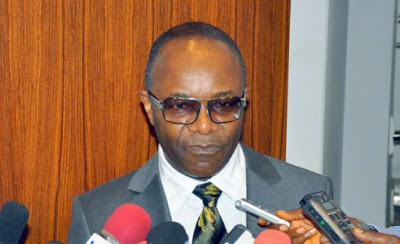The Minister of State for Petroleum Resources, Dr Ibe Kachikwu has reiterated Federal Government’s resolve to reduce importation of petroleum products from the present 95 per cent to 60 per cent by 2018.
Kachikwu stated this at the Rainoil 20th Anniversary Lecture organised by the company in Lagos on Wednesday.
The theme of the anniversary was: “The Nigerian Oil and Gas Industry: Opportunities, Challenges and Prospects of the Downstream Sector”.
The minister of state said that with the proposed construction of modular refineries in the Niger Delta and more investments in the sector, the importation of refined products would be reduced to 60 per cent by 2018.
According to him, the country will start exporting refined products with the commencement of Dangote Refinery in 2019.
“The nation is at the turning point where the downstream industry is more critical than ever and will drive the economy.
“Currently, the NNPC imports over 95 per cent of petroleum products owing to challenges being faced by marketers in accessing Foreign Exchange.
“After 20 years in this industry, I have seen the industry go through challenges but regardless of all that, we are optimistic that there are a lot of opportunities in the sector.
“Going by our plans presently in the industry, our importation of petroleum products will be down to 60 per cent next year and 0 per cent import by 2020.
“It is achievable as Federal Government has shown a strong will to revamping the refineries coupled with the plan to bring about 20,000 barrels per day from modular refinery set to come on stream,” he said.
The minister was represented by the Group Executive Director/Chief Operating Officer Downstream, Nigerian National Petroleum Corporatiom (NNPC), Mr Henry Ikem-Obih.
Kachikwu said the country’s refining capacity for the first quarter of this year presently peaked at 10 million barrels of crude oil.
This he noted was against eight million and 24 million barrels recorded for the entire years of 2015 and 2016 respectively.
Mr Reginald Stanley, a former Executive Secretary of Petroleum Products Pricing Regulatory Agency (PPPRA), and Chairman, Board of Advisors urged investors to collaborate and invest in developing a refinery in the country.
According to him, a single marketer cannot invest in building a refinery because refinery costs more than 250 million dollars for 20,000 barrels today.
“Refinery is not going to work with the present structure of management.
“This is a very tough business and should not be under government management in order to achieve its purpose.
“Today, refineries are such that you must be extremely efficient, because it’s a tough business and it is only the toughest that will survive, and interested investors in modular refineries should plan well,’’ he said.
Also speaking, the Chairman of Depot and Petroleum Products Marketers Association (DAPPMA), Mr Dapo Abiodun called for total deregulation of downstream which remains a great challenge to the development in the industry.
“The downstream business is at a verge of shut down over the huge debt log of two billion dollars owed marketers.
“We need a deregulated downstream to allow market forces drive the industry.
“Our challenges range from under-optimise facilities, forex as well as policy inconsistency.
“With the current price of crude oil in the market and the cap price set out by the Federal Government at N145 per litre, it does not encourage importation of petroleum products.
“As current landing cost of petrol is N160 per litre which makes it impossible for the marketers to continue to import.” he said
Abiodun, however, called for full deregulation of the downstream sector to give room for participation of private sector.
Dr Gabriel Ogbechie, the Group Managing Director, Rainoil Ltd. said the exit of subsidy payment without regulating the sector, had brought a lot of challenges for the downstream sector.
“But regardless of that, we are still optimistic that there are a lot of opportunities in the sector for a country of 180 million people moving around by cars.
“This is the time for us to look at the downstream and factor a way forward,’’ he said. (NAN)



 Premier League
Premier League